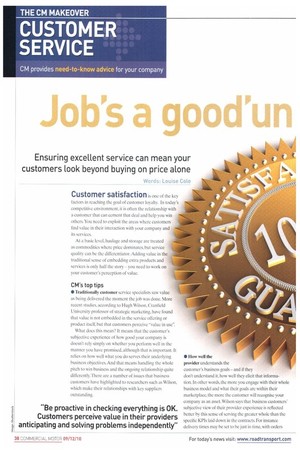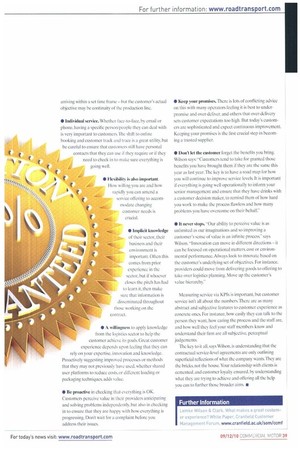Ensuring excellent service can mean your customers look beyond buying on price alone
Page 38

Page 39

If you've noticed an error in this article please click here to report it so we can fix it.
Woros: Louise Coie
Customer satisfaction is one of the ke■
factors in reaching the goal of customer loyalty. In today's competitive environment, it is often the relationship with a customer that can cement that deal and help you win others. You need to exploit the areas where customers find value in their interaction with your company and its services.
At a basic level, haulage and storage are treated as commodities where price dominates, but service quality can be the differentiator. Adding value in the traditional sense of embedding extra products and services is only half the story — you need to work on your customer's perception of value.
CM's top tips • Traditionally customer service specialists saw value as being delivered the moment the job was done. More recent studies, according to Hugh Wilson, Cranfield University professor of strategic marketing, have found that value is not embedded in the service offering or product itself, but that customers perceive "value in use".
What does this mean? It means that the customer's subjective experience of how good your company is doesn't rely simply on whether you perform well in the manner you have promised, although that is important. It relies on how well what you do serves their underlying business objectives. And that means handling the whole pitch to win business and the ongoing relationship quite differently.There are a number of issues that business customers have highlighted to researchers such as Wilson, which make their relationships with key suppliers outstanding. • How well the provider understands the customer's business goals — and if they don't understand it, how well they elicit that information. In other words, the more you engage with their whole business model and what their goals are within their marketplace, the more the customer will recognise your company as an asset. Wilson says that business customers' subjective view of their provider experience is reflected better by this sense of serving the greater whole than the specific I{Pls laid down in the contracts. For instance delivery times may be set to he just in time, with orders
arriving within a set time frame — hut the customer's actual objective may be continuity of the production line.
• Individual service. Whether face-to-face, by email or phone, having a specific person/people they can deal with is very important to customers:the shift to online booking and customer track and trace is a great utility. but be careful to ensure that customers still have personal contacts that they can use if they require or if they need to check in to make sure everything is
going well.
• Flexibility is also important. How willing you are and how rapidly you can amend a service offering to accommodate changing • customer needs is crucial.
• Implicit knowledge of their sector, their business and their environment is important. Often this comes from prior experience in the sector, but if whoever closes the pitch has had to learn it, then make sure that information is disseminated throughout those working on the contract.
• A willingness to apply knowledge from the logistics sector to help the
customer achieve its goals. Great customer experience depends upon feeling that they can rely on your expertise, innovation and knowledge. Proactively suggesting improved processes or methods that they may not previously have used, whether shared user platforms to reduce costs, or different loading or packaging techniques, adds value.
• Be proactive in checking that everything is OK. Customers perceive value in their providers anticipating and solving problems independently, hut also in checking in to ensure that they are happy with how everything is progressing. Don't wait for a complaint before you address their issues. • Keep your promises. There is lots of conflicting advice on this with many operators feeling it is best to underpromise and over-deliver, and others that over-delivery sets customer expectations too high. But today's customers are sophisticated and expect continuous improvement. Keeping your promises is the first crucial step in becoming a trusted supplier.
• Don't let the customer forget the benefits you bring. Wilson says: 'Customers tend to take for granted those benefits you have brought them if they are the same this year as last year. The key is to have a road map for how you will continue to improve service levels. It is important if everything is going well operationally to inform your senior management and ensure that they have drinks with a customer decision maker, to remind them of how hard you work to make the process flawless and how many problems you have overcome on their behalf."
• II never stops. ''Our ability to perceive value is as unlimited as our imaginations and so improving a customer's sense of value is an infinite process." says Wilson. "Innovation can move in different directions — it can be focused on operational matters, cost or environmental performance. Always look to innovate based on the customer's underlying set of objectives. For instance, providers could move from delivering goods to offering to take over logistics planning. Move up the customer's value hierarchy.
Measuring service via KPIs is important, but customer service isn't all about the numbers. There are as many abstract and subjective features to customer experience as concrete ones. For instance, how easily they can talk to the person they want, how caring the process and the staff are, and how well they feel your staff members know and understand their firm are all subjective, perceptual judgements.
The key to it all, says Wilson, is understanding that the contractual service-level agreements are only outlining superficial reflections of what the company wants. They are the bricks. not the house. Your relationship with clients is cemented, and customer loyalty ensured, by understanding what they are trying to achieve and offering all the help you can to further those broader aims. •
























































































































